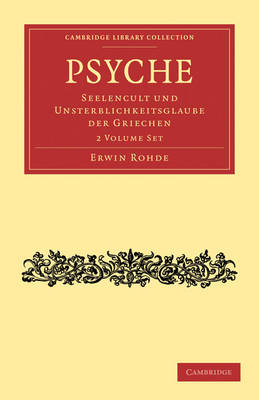Cambridge Library Collection - Classics
2 primary works • 3 total works
Volume 1
In this work, first published in two volumes in 1890 and 1894, Erwin Rohde (1845-1898), the German classical scholar and friend of Nietzsche, describes the ancient Greek cult of souls and establishes the sources of the belief in the immortality of the soul, exploring its relation to life both before and after death. This belief in the survival of the soul already existed in the earliest Greek writings, but when and from where did it originate? In Volume 1 Rohde examines belief in the soul as it appears in Homeric poetry and within local cults, and finds that the idea of an afterlife is already represented in different forms in the works of Hesiod and Aeschylus. He also discusses burial rites and the Eleusinian Mysteries. Psyche, reissued here in the 1898 edition, remains a standard reference work on this topic.
Volume 2
In this work, first published in two volumes in 1890 and 1894, Erwin Rohde (1845-1898), the German classical scholar and friend of Nietzsche, describes the ancient Greek cult of souls and establishes the sources of the belief in the immortality of the soul, exploring its relation to life both before and after death. This belief in the survival of the soul already existed in the earliest Greek writings, but when and from where did it originate? Volume 2 examines the question in the context of the worship of Dionysos, arguing that there were originally many sides to the cult of the wine-god, and that one of these may have been the source of this belief. Psyche, reissued here in the 1898 edition, remains a standard reference work on this topic.
In this work, first published in two volumes in 1890 and 1894, Erwin Rohde (1845-1898), the German classical scholar and friend of Nietzsche, describes the ancient Greek cult of souls and establishes the sources of the belief in the immortality of the soul, exploring its relation to life both before and after death. This belief in the survival of the soul already existed in the earliest Greek writings, but when and from where did it originate? In Volume 1 Rohde examines belief in the soul as it appears in Homeric poetry and within local cults, and finds that the idea of an afterlife is already represented in different forms in the works of Hesiod and Aeschylus. Volume 2 points to the cult of Dionysos as the source of the belief in immortality. Psyche, reissued here in the 1898 edition, remains a standard reference work on this topic.

